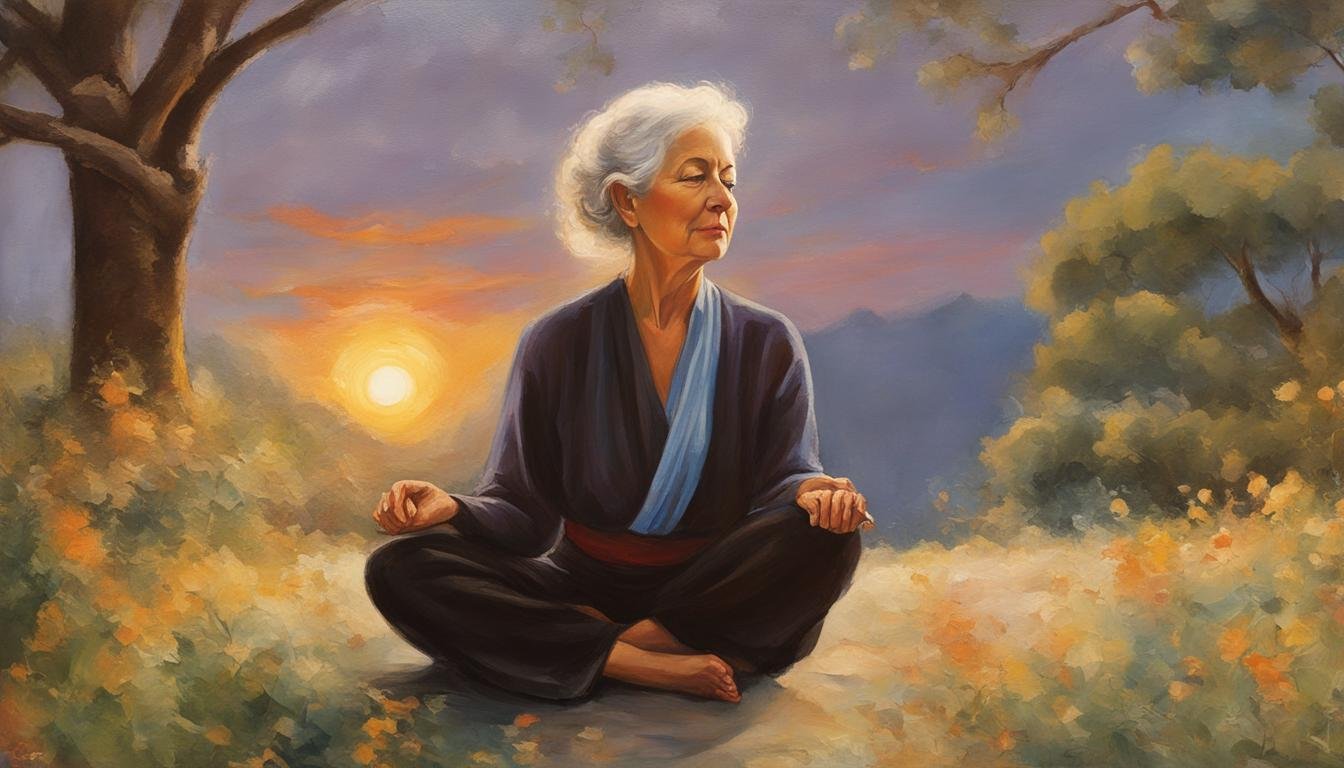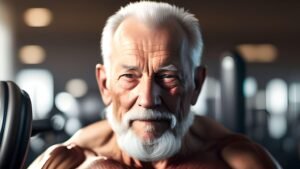In this section, we will explore the incredible benefits that yoga offers in aging well. Aging gracefully with yoga is not just a concept; it is a reality that can greatly enhance our physical health and mobility as we grow older. Moreover, yoga has been proven to have a positive impact on our mental and emotional well-being, helping us achieve a balanced state of mind.
One of the key advantages of practicing yoga, especially for seniors, is the ability to enhance flexibility and maintain a sense of ease and fluidity in movement. Additionally, yoga can significantly contribute to improving strength and balance in older adults, reducing the risk of falls and promoting overall stability.
Another remarkable aspect of yoga is its anti-aging benefits. By embracing a regular yoga practice, we can slow down the aging process and cultivate a youthful mindset. Additionally, yoga supports cognitive health, promoting concentration, memory, and overall brain function as we age.
Furthermore, stress reduction and relaxation are vital in maintaining well-being as we get older. Yoga provides effective techniques for managing stress and achieving a state of calm and tranquility, which are crucial for our overall quality of life.
As we explore the various dimensions of yoga and its impact on aging well, we will discover that it offers a holistic approach that integrates the physical, emotional, and spiritual dimensions of our lives. By embracing yoga, we can embark on a journey of whole-body wellness and experience the transformative benefits it offers.
Key Takeaways:
- Yoga offers numerous benefits for aging well, including improved physical health and mobility.
- Practicing yoga can greatly enhance our mental and emotional well-being as we age.
- Yoga helps to enhance flexibility, strength, and balance in older adults.
- Regular yoga practice can slow down the aging process and support cognitive health.
- Yoga provides effective stress reduction and relaxation techniques for seniors.
Understanding Aging and the Concept of Longevity
In this section, we will explore the fascinating process of aging and delve into the concept of longevity. Aging is a natural and inevitable part of life that affects everyone. As we grow older, our bodies undergo various changes, both externally and internally. These changes often come with visible signs of aging, such as wrinkles and gray hair, but there are also less apparent changes happening within our bodies.
Signs of aging can manifest in reduced mobility, declining cognitive function, and decreased energy levels. It’s important to understand that aging is a complex process influenced by genetics, lifestyle, and environmental factors. While we cannot stop the aging process, we can take steps to embrace it and age gracefully.
There are many myths surrounding aging, but it’s crucial to separate fact from fiction. It’s not true that aging means a decline in physical and mental health. With the right lifestyle choices, including regular exercise, a balanced diet, and proper self-care, we can maintain good health well into our golden years. Aging also presents unique opportunities for personal growth, wisdom, and new experiences.
To truly embrace the concept of longevity, we must adopt a holistic approach to aging well. This means taking care of our physical, mental, and emotional well-being. Throughout this article, we will explore how the practice of yoga can play a significant role in promoting healthy aging and enhancing our overall quality of life as we grow older. By understanding the aging process and the concept of longevity, we can better equip ourselves to age with vitality and grace.
Understanding Aging and the Concept of Longevity
| Signs of Aging | Myths About Aging |
|---|---|
| – Wrinkles | – Aging means decline |
| – Reduced mobility | – Aging equals poor health |
| – Declining cognitive function | – Aging is irreversible |
| – Decreased energy levels | – Aging is all about physical appearance |
Understanding the aging process and debunking common myths is the first step towards embracing a positive and proactive approach to healthy aging. By taking care of our bodies and minds, we can lead fulfilling lives as we age.
The Role of the Immune System in Aging
In the process of aging, the immune system plays a vital role in maintaining overall health and well-being. However, as we age, the immune system undergoes certain changes that can impact its ability to defend against infections and diseases. It becomes more susceptible to infections and less efficient in responding to pathogens. It is essential, therefore, to take proactive steps to fortify the immune system and promote healthy aging.
Yoga has emerged as a powerful tool in supporting immune health and enhancing overall well-being, particularly in seniors. Regular yoga practice has been shown to strengthen the immune system by reducing chronic inflammation, improving circulation, and boosting the body’s natural defense mechanisms. By engaging in gentle stretching, deep breathing, and meditation, seniors can help alleviate stress, which has a significant impact on immune function.
To fortify the immune system through yoga, it is important to incorporate specific poses and practices. Poses such as downward dog, cobra, and bridge pose can help stimulate the thymus gland, which plays a key role in immune function. Additionally, practices like pranayama (breathing exercises) and meditation can calm the mind, reduce stress, and promote a healthy immune response.
The Role of Nutrition in Supporting the Immune System
In addition to yoga, a well-balanced diet plays a crucial role in supporting the immune system as we age. Adequate intake of important nutrients, such as vitamin C, vitamin D, zinc, and omega-3 fatty acids, can help strengthen the immune system and enhance its ability to fight infections. Including immune-boosting foods like citrus fruits, leafy greens, nuts, and fish in your diet can provide the necessary nutrients to support immune health.
| Nutrient | Food Sources |
|---|---|
| Vitamin C | Citrus fruits, berries, bell peppers |
| Vitamin D | Fatty fish, fortified dairy products |
| Zinc | Red meat, poultry, shellfish, legumes |
| Omega-3 Fatty Acids | Fatty fish, flaxseeds, chia seeds |
By combining a regular yoga practice with a nutritious diet, older adults can take proactive steps to support their immune system and age well. Embracing a holistic approach that encompasses both physical and mental well-being is key to maintaining a strong immune system and enjoying a healthy and fulfilling life as we age.
The Power of Yoga and Meditation for Aging Well
As we age, it’s essential to prioritize our overall well-being, and that includes both physical and mental health. Yoga and meditation have emerged as powerful practices that can significantly contribute to aging well. These practices offer a holistic approach to healthy aging, addressing the needs of our bodies and minds. Let’s explore the benefits of yoga and meditation for seniors and how they can enhance the aging process.
Yoga, with its gentle yet effective movements, is perfectly suited for seniors. It helps improve flexibility, build strength, and enhance balance, which are crucial for maintaining independence and preventing falls. Through regular practice, seniors can increase their range of motion, reduce joint pain, and improve overall physical function. Additionally, yoga promotes relaxation and stress reduction, which can have a profound impact on mental well-being.
Meditation, on the other hand, offers a range of mental and emotional benefits. It helps seniors cultivate mindfulness, allowing them to be more present and engaged in their daily lives. Meditation has been shown to reduce stress, anxiety, and depression, promoting a positive mindset and emotional resilience. By incorporating these practices into their routine, seniors can experience a higher quality of life, greater self-awareness, and improved overall well-being.
Holistic Aging: Integrating Physical, Emotional, and Spiritual Dimensions
In the pursuit of healthy aging, it is essential to embrace a holistic approach that considers not only our physical well-being but also our emotional and spiritual dimensions. Holistic aging recognizes the interconnectedness of these aspects and emphasizes their integration in order to achieve overall wellness. By incorporating practices such as yoga into our daily lives, we can effectively nurture our physical, emotional, and spiritual well-being simultaneously.
Yoga, with its emphasis on mindful movement, breath awareness, and meditation, provides a holistic framework for aging well. Physical well-being is enhanced through the gentle stretches and postures that promote flexibility, strength, and balance. Emotional well-being is nurtured as we learn to remain present and cultivate self-compassion. And on a spiritual level, yoga creates a space for connection with our inner selves, offering a sense of purpose and meaning.
Integrating these dimensions allows us to experience greater harmony and balance in our lives as we age. It enables us to cultivate resilience and adaptability, empowering us to navigate life’s challenges with grace and equanimity. By taking a holistic approach to our well-being, we can truly embrace the journey of aging and unlock our full potential for growth and fulfillment.
“Holistic aging recognizes the interconnectedness of physical, emotional, and spiritual dimensions, emphasizing their integration for overall wellness.”
The Benefits of Holistic Aging:
- Promotes physical health, including improved flexibility, strength, and balance.
- Nurtures emotional well-being, fostering self-compassion and resilience.
- Cultivates spiritual well-being, offering a sense of purpose and connection.
- Enhances overall quality of life and personal growth.
By embracing holistic aging and integrating physical, emotional, and spiritual dimensions, we can cultivate a deep sense of well-being as we navigate the aging process. Yoga provides a powerful tool for this integration, guiding us towards a more fulfilling and balanced life. So let us embrace this holistic approach and embark on a journey of healthy aging that encompasses the whole self.
| Physical Well-being | Emotional Well-being | Spiritual Well-being |
|---|---|---|
| Improved flexibility, strength, and balance through yoga | Nurturing self-compassion and resilience | Creating a sense of purpose and connection |
| Enhanced physical health and vitality | Promoting emotional well-being and mindfulness | Cultivating a deeper understanding of self |
| Reduced risk of physical ailments and injuries | Developing coping mechanisms for stress and anxiety | Exploring spirituality and personal growth |
Real-Life Stories: The Potential of Aging Well with Yoga
Over the years, we have witnessed numerous inspiring stories of individuals who have embraced yoga and experienced remarkable improvements in their physical health, mental well-being, and overall quality of life as they age. These real-life stories serve as a testament to the potential of yoga in supporting healthy aging.
One such story is that of Jane, a 68-year-old woman who had been struggling with balance issues and joint stiffness. After incorporating a regular yoga practice into her routine, Jane noticed a significant improvement in her strength, flexibility, and balance. Her confidence grew as she realized she was able to perform daily tasks with ease and without the fear of falling. Yoga also provided Jane with a sense of peace and mindfulness, allowing her to navigate the challenges of aging with grace and resilience.
Another inspiring example is Michael, a 72-year-old man who had been experiencing stress and anxiety related to retirement and the changes that come with aging. Through the practice of yoga, Michael found an outlet for relaxation and self-reflection. The deep breathing techniques and meditation practices helped him manage stress and cultivate a sense of inner calm. Gradually, Michael experienced a newfound sense of joy and contentment, embracing his golden years with a positive mindset.
| Real-Life Stories: The Potential of Aging Well with Yoga |
|---|
| Jane, 68, found improved strength, flexibility, and balance through yoga. |
| Michael, 72, used yoga to manage stress and cultivate a sense of inner calm. |
These stories are just a glimpse into the incredible potential that yoga holds for aging well. They highlight the profound impact that a regular yoga practice can have on physical health, mental well-being, and overall quality of life in older adults. It is our hope that these real-life examples inspire others to explore the benefits of yoga and embark on their own journey towards aging gracefully with yoga.
Yoga as a Complementary Treatment for Cognitive Health and Aging
As we age, cognitive health becomes increasingly important for maintaining a high quality of life. Fortunately, the practice of yoga offers numerous benefits for promoting cognitive well-being in older adults. Yoga has been shown to improve concentration, enhance memory, and boost overall brain health, making it an excellent complementary treatment for age-related cognitive decline.
Research has found that regular yoga practice can positively impact cognitive function by increasing blood flow to the brain and stimulating neural connections. The combination of physical postures, breathing exercises, and meditation in yoga helps to improve focus, attention, and mental clarity. Additionally, yoga can reduce stress and anxiety, which are known to negatively affect cognitive abilities.
Incorporating specific yoga poses and sequences into a regular practice can target cognitive health even further. Poses that involve balancing, such as Tree Pose (Vrksasana), engage the brain by requiring focus and concentration. Inversions, such as Headstand (Sirsasana), increase blood flow to the brain, enhancing cognitive function. Forward folds, such as Standing Forward Bend (Uttanasana), promote relaxation and mental calmness, reducing cognitive fatigue.
In conclusion, yoga serves as a valuable tool for promoting cognitive health and aging well. By incorporating yoga into your routine, you can enhance concentration, improve memory, and support overall brain function. Whether you’re a beginner or have been practicing for years, integrating yoga into your daily life can have profound effects on your cognitive well-being.
Stress Reduction and Relaxation: The Role of Yoga in Well-Being
When it comes to managing stress and achieving a state of relaxation, yoga has proven to be an effective tool for seniors. Through various relaxation techniques, such as deep breathing and mindfulness practices, yoga helps individuals of all ages find peace amidst the chaos of daily life. For seniors, the benefits of yoga in stress reduction and relaxation are even more profound, providing a much-needed sense of calm and serenity.
One of the key components of yoga is deep breathing, which promotes relaxation by activating the body’s relaxation response. By taking slow, deep breaths and consciously focusing on the breath, seniors can reduce the activity of the sympathetic nervous system, responsible for the body’s “fight-or-flight” response, and activate the parasympathetic nervous system, which promotes relaxation and healing.
Another relaxation technique used in yoga is mindfulness, which involves being fully present in the moment and non-judgmentally observing one’s thoughts, feelings, and bodily sensations. This practice cultivates a sense of awareness and acceptance, allowing seniors to let go of stress and worries. By practicing mindfulness through yoga, older adults can experience a greater sense of peace, clarity, and overall well-being.
Incorporating yoga into their daily routine can help seniors not only manage stress but also improve their overall physical health, mental well-being, and quality of life. As they embrace the various relaxation techniques offered by yoga, seniors can find solace in the present moment and rediscover a sense of calm amidst life’s challenges.
Yoga for Physical Strength, Balance, and Flexibility in Older Adults
As we age, maintaining physical strength, balance, and flexibility becomes increasingly important for overall well-being and independence. Yoga has proven to be an effective practice for older adults to enhance these essential aspects of physical health. By incorporating yoga into their routine, seniors can experience significant improvements in their physical abilities, leading to a better quality of life and reduced risk of falls.
Yoga for strength: Yoga poses, such as Warrior I and II, Downward Facing Dog, and Chair Pose, help to build muscle strength in the arms, legs, core, and back. These poses engage multiple muscle groups, providing a comprehensive workout that improves overall strength and stability. Regular practice of yoga can help seniors maintain their strength and prevent muscle loss, enabling them to perform daily activities with ease.
Yoga for balance: Aging often comes with a decline in balance, increasing the risk of falls and injuries. Yoga poses that promote balance, such as Tree Pose, Warrior III, and Half Moon Pose, help seniors improve their proprioception and stability. Through the practice of these poses, older adults can strengthen their core muscles and develop a better sense of balance, reducing the likelihood of falls and enhancing their overall stability.
Yoga for flexibility: Flexibility tends to decrease as we age, leading to stiffness and limited range of motion. Yoga is renowned for its ability to improve flexibility through poses like Forward Fold, Triangle Pose, and Cobra Pose. These poses stretch and elongate the muscles, tendons, and ligaments, increasing flexibility and improving joint mobility. By regularly engaging in yoga, older adults can regain and maintain their flexibility, allowing them to move more freely and comfortably.
| Yoga for Physical Strength | Yoga for Balance | Yoga for Flexibility |
|---|---|---|
| – Warrior I | – Tree Pose | – Forward Fold |
| – Warrior II | – Warrior III | – Triangle Pose |
| – Downward Facing Dog | – Half Moon Pose | – Cobra Pose |
| – Chair Pose |
By incorporating these yoga poses into their routine, older adults can experience significant improvements in physical strength, balance, and flexibility. It is advisable for seniors to practice yoga under the guidance of a qualified instructor who can provide modifications and ensure that the poses are performed safely and effectively. With regular practice, yoga can become a valuable tool for older adults to maintain their physical independence and enjoy a higher quality of life.
Anti-Aging Benefits of Yoga
As we age, it is natural to desire a youthful appearance and vibrant health. Yoga has emerged as a powerful tool that can help slow down the aging process and promote healthy longevity. By incorporating yoga into our lives, we can experience a range of anti-aging benefits that rejuvenate our bodies and minds.
One of the key ways yoga promotes anti-aging is by improving our physical health. Regular practice of yoga poses helps to increase muscle tone and strength, which can contribute to a more youthful and energetic body. Additionally, yoga enhances flexibility, allowing for greater range of motion and reducing the risk of injuries as we age. By maintaining strong and flexible bodies, we can continue to participate in our favorite activities and enjoy an active lifestyle well into our later years.
Yoga also has a profound impact on our mental and emotional well-being, which plays a crucial role in healthy aging. Through the practice of deep breathing, meditation, and mindfulness, yoga helps to reduce stress and promote relaxation. This can have a direct effect on the aging process, as chronic stress has been linked to accelerated aging and a range of age-related diseases. By reducing stress levels, yoga supports a calm and peaceful mind, contributing to overall mental and emotional health.
Furthermore, yoga encourages a positive outlook on aging and a mindful approach to our bodies. It teaches us to embrace the present moment, accepting ourselves and our bodies as they are. This mindset shift can have a transformative effect on our perception of aging, allowing us to fully embrace the wisdom and beauty that comes with growing older. By practicing yoga, we can cultivate a sense of self-acceptance and appreciation, promoting healthy aging from within.
| Benefits of Yoga for Anti-Aging |
|---|
| Improved physical health and vitality |
| Enhanced mental and emotional well-being |
| Increased flexibility, strength, and balance |
| Reduced stress levels and relaxation |
| Promotes a positive mindset towards aging |
By embracing yoga as a holistic approach to healthy aging, we can tap into its anti-aging benefits and unlock the potential for a fulfilling and joyful life as we grow older. Whether through physical poses, breathwork, or meditation, yoga offers us a path to embrace the aging process with grace and vitality.
Conclusion
In conclusion, embracing yoga as a lifestyle choice can have profound benefits for aging well. With its holistic approach, yoga supports physical health, mental and emotional well-being, flexibility, strength, balance, and longevity in older adults. By incorporating yoga into their daily routines, seniors can age gracefully and enjoy a healthy longevity.
Through the practice of yoga, older adults can experience improved physical health and mobility. Yoga helps maintain muscle strength, enhances flexibility, and improves balance, reducing the risk of falls and promoting a better quality of life. Additionally, yoga has been shown to have positive effects on mental and emotional well-being, supporting cognitive health and promoting a youthful mindset.
Furthermore, yoga provides a powerful tool for stress reduction and relaxation in seniors. The deep breathing and mindfulness practices used in yoga help manage stress, calm the mind, and create a sense of inner peace. By incorporating yoga into their daily routines, older adults can enhance their overall well-being and find a greater sense of balance and harmony in their lives.
In conclusion, yoga has emerged as a valuable practice for promoting well-being in older adults. Its benefits extend beyond the physical realm, encompassing mental, emotional, and spiritual dimensions. By embracing yoga, seniors can age well, maintaining vitality, and enjoying a healthy and fulfilling life.
FAQ
What are the benefits of practicing yoga for aging well?
Practicing yoga can improve physical health, enhance mental and emotional well-being, increase flexibility, strength, and balance in seniors.
Can yoga help with anti-aging?
Yes, yoga has anti-aging benefits. It can help reduce the appearance of wrinkles, promote overall physical health, and support longevity.
How does yoga promote cognitive health in older adults?
Yoga can improve concentration, enhance memory, and support overall brain health, making it a complementary treatment for age-related cognitive decline.
Is yoga effective for stress reduction and relaxation in seniors?
Yes, yoga offers various relaxation techniques such as deep breathing and mindfulness practices, which can help seniors manage stress and achieve a state of relaxation and calm.
Can yoga help improve physical strength, balance, and flexibility in older adults?
Absolutely. Yoga can help seniors maintain muscle strength, improve balance, and enhance overall flexibility, leading to a better quality of life and reduced risk of falls.
What is holistic aging, and how does yoga support it?
Holistic aging involves integrating physical, emotional, and spiritual dimensions into one’s life. Yoga supports overall well-being through this holistic approach, promoting physical health, emotional well-being, and spiritual growth in older adults.
Are there real-life stories of individuals who have benefited from yoga in aging well?
Yes, there are inspiring stories of individuals who have experienced the transformative impact of yoga on physical health, mental well-being, and overall quality of life in older adults.
How does yoga impact the immune system and promote healthy aging?
Aging can have an impact on the immune system, but practicing yoga can help fortify it and enhance overall well-being.
Can meditation be beneficial for aging well?
Yes, meditation, when practiced alongside yoga, can contribute to improved health and vitality during the aging process. It can enhance mental clarity, reduce stress, and support emotional well-being in older adults.
What are some common myths about aging that yoga can help debunk?
Yoga can help debunk common myths about aging, such as the belief that decline is inevitable or that older adults cannot maintain physical and mental well-being. Yoga shows that individuals can age gracefully and maintain vibrant health.






